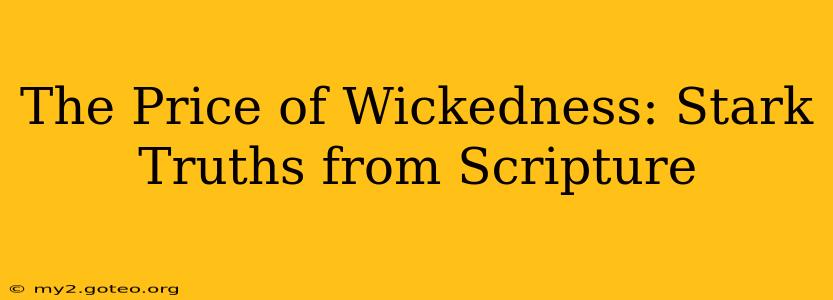The Bible, a collection of ancient texts revered by billions, doesn't shy away from the consequences of wickedness. While grace and forgiveness are central themes, the scriptures also paint a stark picture of the price paid for choosing a path of sin. This exploration delves into the biblical perspective on wickedness, examining its consequences both in this life and the hereafter. We'll explore various scriptures and unpack their profound implications.
What Does the Bible Say About the Consequences of Sin?
The Bible consistently links wickedness with negative outcomes. Proverbs, for example, is replete with warnings against various forms of wrongdoing and the subsequent repercussions. The concept of "reaping what you sow" (Galatians 6:7) is a recurring motif, emphasizing the inherent connection between actions and consequences. This isn't a simplistic "eye for an eye" mentality, but rather a recognition of the natural order—that choices have ramifications, both individually and collectively. Wickedness, therefore, isn't merely a moral failing; it's a path that leads to suffering, both spiritual and often physical.
What are the Spiritual Consequences of Wickedness According to the Bible?
The spiritual consequences of wickedness are perhaps the most significant. Separation from God is a recurring theme. Sin creates a barrier between humanity and the divine, hindering the experience of God's love and grace. This separation is described in various ways, from alienation and emptiness to spiritual death. The Bible emphasizes the importance of repentance and reconciliation, but the consequences of ignoring this call are severe. This spiritual desolation can manifest in various ways, such as feelings of guilt, shame, and despair.
Does the Bible Discuss the Physical Consequences of Wickedness?
While the Bible's primary focus is on spiritual matters, it also acknowledges the physical ramifications of wickedness. Disease, poverty, and societal breakdown are often presented as consequences of collective sin and moral decay. However, it's crucial to avoid simplistic cause-and-effect interpretations. The Bible doesn't suggest a direct, deterministic link between specific sins and specific physical ailments. Instead, it highlights the ways in which sin disrupts the natural order, leading to instability and suffering. The consequences are often systemic, affecting entire communities.
What is the Ultimate Price of Wickedness in the Bible?
The ultimate price of wickedness, according to the Bible, is eternal separation from God. This concept, often referred to as "hell" or "eternal damnation," is a sobering reminder of the gravity of choosing a life of sin. It's important to understand that this isn't a vengeful punishment but rather a consequence of rejecting God's offer of reconciliation and choosing instead to live independently of Him. This separation isn't merely physical but also spiritual, signifying a complete absence of God's love and presence.
How Can I Avoid the Price of Wickedness?
The Bible offers a clear path to avoid the price of wickedness: repentance and faith in Jesus Christ. Repentance involves acknowledging our sins and turning away from them, while faith in Jesus represents trusting in His sacrifice to atone for our sins. Through faith, believers receive forgiveness and reconciliation with God, breaking the cycle of sin and its consequences. This process of transformation is not instantaneous, but it's a journey of ongoing growth and sanctification. The scriptures offer guidance and support, emphasizing the importance of prayer, community, and obedience to God's will.
Can a Person Who Has Committed Wicked Acts Find Forgiveness?
Absolutely. The Bible emphasizes God's boundless love and forgiveness. While the consequences of sin are real, God's grace transcends our failings. Through repentance and faith in Jesus Christ, individuals can experience complete forgiveness and restoration. This forgiveness isn't a mere erasure of past actions, but a transformative process that heals the heart and empowers individuals to live a life of purpose and righteousness. The key is genuine repentance, a sincere turning away from sin, and a commitment to live in accordance with God's will.
Conclusion
The Bible presents a profound and nuanced perspective on the price of wickedness. It’s not a simple equation of sin equaling punishment, but rather an exploration of the spiritual, physical, and eternal ramifications of choices made. The overarching message, however, is one of hope and redemption. While the consequences of sin are real, God's offer of forgiveness and reconciliation is even greater. Understanding this balance is crucial to navigating the complexities of faith and living a life pleasing to God.

